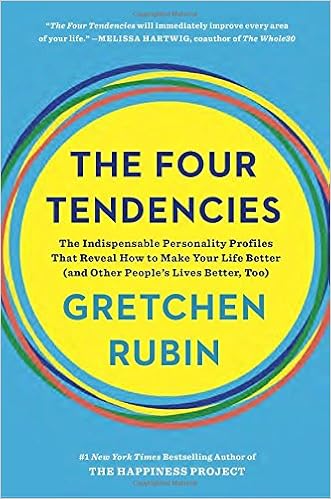 The Four Tendencies: The Indispensable Personality Profiles That Reveal How to Make Your Life Better (and Other People’s Live Better, Too) by Gretchen Rubin, 2017. Link is to the book’s page on the author’s website.
The Four Tendencies: The Indispensable Personality Profiles That Reveal How to Make Your Life Better (and Other People’s Live Better, Too) by Gretchen Rubin, 2017. Link is to the book’s page on the author’s website.
I have now done something for her books that I haven’t for anyone else I can think of: Buying them, in hardback, as soon as they come out. This is number four in her series on happiness, habits, and now . . . heuristics? I can’t come up with a third “h” word. It’s actually a deep dive into her theory about what she calls personality tendencies. I’ve read the sections that have to do most with my own tendencies: Obliger and Upholder, and gotten bogged down with the Questioner and Rebel sections. I’ll come back to them later.
For those who haven’t been breathlessly following this whole when-will-the-book-come-out countdown and/or aren’t fans of Gretchen (or of me), perhaps I should explain what these tendencies are. Everyone has taken a personality quiz at one time or another; some companies even require the Meyers-Briggs test, which I’ve taken and can’t at all remember the outcome of. (How’s that for an awkward sentence?) Gretchen’s framework doesn’t purport to tell the whole story about anyone; instead, she focuses on how people respond to expectations, both inner and outer. A classic outer expectation would be a work deadline; a classic inner one, a New Year’s resolution. In fact, it was by asking readers on her blog how they felt about such resolutions that Gretchen was able to start codifying the tendencies. (Upholders make and keep resolutions easily, b/c they’re good at outer and inner expectations; Obligers dislike them because they don’t respond well to inner expectations; Questioners might make resolutions, but only if they’ve thought their way through the reasons for them and probably wouldn’t make them on a certain date, and Rebels won’t make them at all.)
Funny story about how this book got written: Originally it was supposed to be a booklet, a small writing project that Gretchen was going to do last summer in which she examined the tendencies in a little more detail than she had in her book on habits. But over the course of her research the small booklet ballooned into over 100,000 words, and she ended up with an 250-page book. As her sister Liz said on the “Happier” podcast, “Only you, Gretchen, could start out to write a pamphlet and end up with a book.” Along the way she did a full-fledged national survey across gender, race, location, and household income, finding that her theory held up. Now she has actual percentages for each tendency, with Obligers, my main tendency, coming in as the largest group with 41%. But that number still isn’t even half. I was a little surprised at that, expecting the Obliger population to be somewhere at maybe 60-70%. (I have a theory that many self-help books are unconsciously directed at Obligers since they are so numerous, but what works for one tendency doesn’t necessarily work for the others; thus the unhelpfulness of much self-help.)
If you don’t know anything about the tendencies, you can take the quiz to figure out what yours is here. (Almost a million people have now taken it.) I can honestly say (and have said before on this blog) that if I had known about my tendency 50 years ago, when I was a teenager, I would have managed my life much better. I’m giving a talk at my church next month about the four tendencies and plan to tell some stories on myself, the main thrust of which are that I don’t do well with big, unstructured blocks of time. I always think it’ll be great to have a whole day (or, in one case, a whole summer) to work on projects, but that never, ever happens. I fritter away my time and then have a time crunch at the last minute. Or, if the project is the result of an inner expectation that only I really care about, it will probably never get done at all. I have to have that push. Because of my tendency, blogging is a great way for me to get writing done. Although I don’t have a huge audience, I know that there are some people out there who read my stuff, and I don’t want to disappoint them. Once I get going, I love writing posts. I may end up posting a video of my talk; keep a lookout for that. (See, I’ve set up an outer expectation for that.)
So I’d highly, highly recommend this book. Not only will you know yourself better, you’ll know those around you better, too. (My son, husband, father-in-law and brother-in-law are all questioners. Guess what? Questioners don’t like to be questioned. Isn’t that weird? But I’ve seen that tendency play out over and over again in my interactions with them. I do tend to be a little badger-y at the best of times, anyway. Once I cottoned onto why they would respond a bit testily—although my son doesn’t do it too much—I could stop taking their reactions personally. They’re just the way they are. If the questions don’t matter much, I drop the issue and save the angst for the important stuff.)
Take the quiz, read the book, apply the principles. Hey, what’s so hard about that?
I’m an obliger, too! I wish I could hear your talk. You always make me think. Please post the video for me!
I am an obliger too.